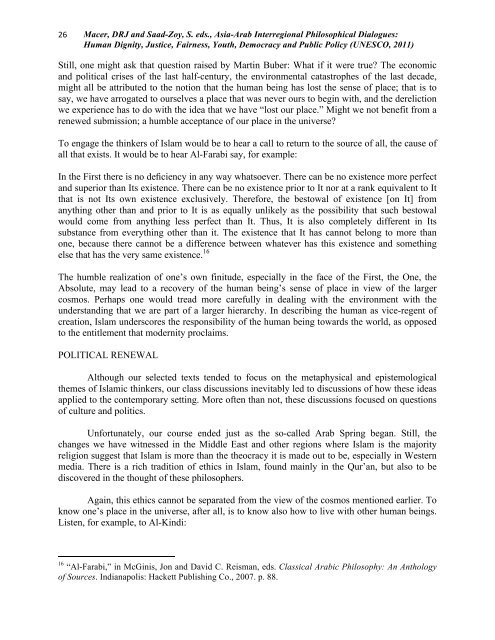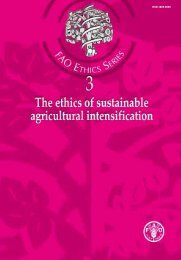Human Dignity, Justice, Fairness, Youth - Eubios Ethics Institute
Human Dignity, Justice, Fairness, Youth - Eubios Ethics Institute
Human Dignity, Justice, Fairness, Youth - Eubios Ethics Institute
You also want an ePaper? Increase the reach of your titles
YUMPU automatically turns print PDFs into web optimized ePapers that Google loves.
26 <br />
Macer, DRJ and Saad-Zoy, S. eds., Asia-Arab Interregional Philosophical Dialogues:<br />
<strong>Human</strong> <strong>Dignity</strong>, <strong>Justice</strong>, <strong>Fairness</strong>, <strong>Youth</strong>, Democracy and Public Policy (UNESCO, 2011)<br />
Still, one might ask that question raised by Martin Buber: What if it were true? The economic<br />
and political crises of the last half-century, the environmental catastrophes of the last decade,<br />
might all be attributed to the notion that the human being has lost the sense of place; that is to<br />
say, we have arrogated to ourselves a place that was never ours to begin with, and the dereliction<br />
we experience has to do with the idea that we have “lost our place.” Might we not benefit from a<br />
renewed submission; a humble acceptance of our place in the universe?<br />
To engage the thinkers of Islam would be to hear a call to return to the source of all, the cause of<br />
all that exists. It would be to hear Al-Farabi say, for example:<br />
In the First there is no deficiency in any way whatsoever. There can be no existence more perfect<br />
and superior than Its existence. There can be no existence prior to It nor at a rank equivalent to It<br />
that is not Its own existence exclusively. Therefore, the bestowal of existence [on It] from<br />
anything other than and prior to It is as equally unlikely as the possibility that such bestowal<br />
would come from anything less perfect than It. Thus, It is also completely different in Its<br />
substance from everything other than it. The existence that It has cannot belong to more than<br />
one, because there cannot be a difference between whatever has this existence and something<br />
else that has the very same existence. 16<br />
The humble realization of one’s own finitude, especially in the face of the First, the One, the<br />
Absolute, may lead to a recovery of the human being’s sense of place in view of the larger<br />
cosmos. Perhaps one would tread more carefully in dealing with the environment with the<br />
understanding that we are part of a larger hierarchy. In describing the human as vice-regent of<br />
creation, Islam underscores the responsibility of the human being towards the world, as opposed<br />
to the entitlement that modernity proclaims.<br />
POLITICAL RENEWAL<br />
Although our selected texts tended to focus on the metaphysical and epistemological<br />
themes of Islamic thinkers, our class discussions inevitably led to discussions of how these ideas<br />
applied to the contemporary setting. More often than not, these discussions focused on questions<br />
of culture and politics.<br />
Unfortunately, our course ended just as the so-called Arab Spring began. Still, the<br />
changes we have witnessed in the Middle East and other regions where Islam is the majority<br />
religion suggest that Islam is more than the theocracy it is made out to be, especially in Western<br />
media. There is a rich tradition of ethics in Islam, found mainly in the Qur’an, but also to be<br />
discovered in the thought of these philosophers.<br />
Again, this ethics cannot be separated from the view of the cosmos mentioned earlier. To<br />
know one’s place in the universe, after all, is to know also how to live with other human beings.<br />
Listen, for example, to Al-Kindi:<br />
16 “Al-Farabi,” in McGinis, Jon and David C. Reisman, eds. Classical Arabic Philosophy: An Anthology<br />
of Sources. Indianapolis: Hackett Publishing Co., 2007. p. 88.

















